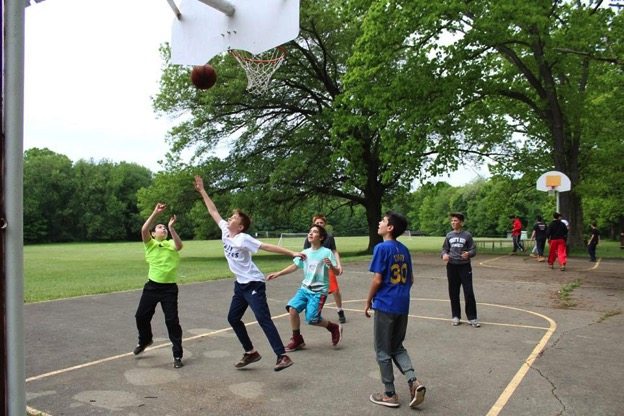PROSPECT, Penn.—Tucked deep into the woods of Pennsylvania, the strings of an electric guitar hummed the tune to Sari Siroun Yar, a traditional Armenian melody swirling in the cool air thousands of miles away from its birthplace.
The musician, once a camper turned counselor was, that evening, a performer.
This decades-long commitment to the Armenian Youth Federation (AYF-YOARF) Junior Seminar surrounded me during my first experience at the educational weekend held at Camp Lutherlyn, an hour outside Pittsburgh, where campers, counselors, advisors and lecturers alike gathered to explore the theme, “The Power of Purpose.” And while there were no barbecues or cell phones during this Memorial Day weekend, there was, more significantly, the creation of new friendships, the sharing of knowledge, the nature-like surroundings—and a very lively game of esheg.
Invited to speak to the youth about the power of film and theater, I shared with the campers, aged 10-17, the impact of Armenians in the performing arts, not only within the community, but also of those who have made and continue to make great strides and significant contributions in world cinema and theater. We viewed film and theater clips of Armenian actors and directors and I shared my story of how a simple idea can manifest into a cultural phenomenon when I penned and staged “Where Is Your Groom” (“Pesad Oor Eh”) and its sequel. The last half of our sessions was dedicated to the campers flexing their creative muscles to write and act out a one-page scene of their own. Their interest, respect, and engagement were unparalleled.
When not working with the campers, I had the chance to sit in on two other lectures—Ara Dinkjian’s “The Power of Music,” where the renowned oud player highlighted the importance of music as a way to unify people and encouraged campers to listen to their impulses and to stand for something in their lives—and Asbarez editor Ara Khachatourian’s session “The Power of Writing,” where he instructed campers to write and mail letters to Washington of political concern, aiming to show them the significance of their voice, no matter their age. Other lecture topics on the powers of science, community service, sports, and Hai Tahd, were just as thought provoking.
During our breakfast, lunch and dinners, I learned more about the lecturers and their ties to AYF Junior Seminar. Most had attended as children—and in some cases, the other lecturers present had been their counselors. One pair was fresh from a trip to Artsakh, participating in the opening of six new homes in the border village of Arajamugh. Their conversations were warm, decades in the making, as they caught up on their childhood friends, recent weddings and births. I thought of the lecturer’s bonds as I looked at the campers during my sessions, envisioning them too to have these same conversations years from now on the picnic tables on the porch of that dining hall.
I never grew up in the AYF/Armenian Revolutionary Federation (ARF) world—my grandfather was Chairman of the Ramgavar Central Committee in Beirut, Lebanon—but I always welcomed invitations to speak at an event or commemoration and what I saw, time and time again, was an inherent unity.
AYF Junior Seminar was no different—no one had an ego and no one scoffed at an airport run. As a friend of mine noted, everyone eats the same food, everyone stays in the same cabins; there is no division among rich or poor nor social hierarchies and cliques.
Armenians, take note.
The potential ability of a single idea to flourish and create a cultural movement was at the center of my talk and as the weekend progressed, I realized the same could be said of the AYF Junior Seminar. A simple thought of gathering Armenian youth for a weekend of education and awareness 40 years ago manifested into cross-country friendships, marriages, children, and new families. The ties among everyone were incredible and each inspired me in their own way: the counselors, many in college or in the post-college phase of their lives, who reserved their Memorial Day Weekend year after year for an important cause close to their hearts; the campers who came wide-eyed and ready to learn; the lecturers who made time to prepare presentations; and the advisors who willingly passed the torch onto the next generation but stood right behind them as support. This is how to transfer power.
When I arrived at the Pittsburgh airport and entered the Junior Seminar van, the greatest hits of Manuel emanating from the speakers overcame the need for any introductions. While being Armenian encompasses many complex feelings, it also elicits a discernible bond rooted in a shared upbringing that only your Armenian brothers and sisters will understand. It digs deeper than the language, the food, and the history—it flows through each of our hearts. And as the guitar strings strummed on fingers that strummed hundreds of years ago, we echoed our distant past, that for one weekend, didn’t seem so distant at all.
Source: Armenian Weekly
Link: Inherent Unity: Reflections from AYF Junior Seminar

